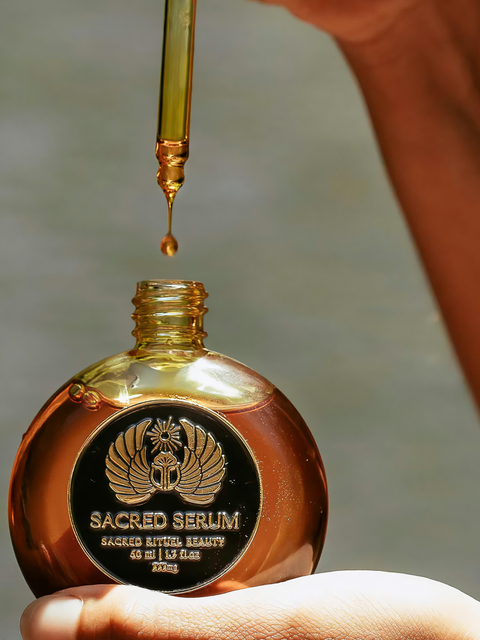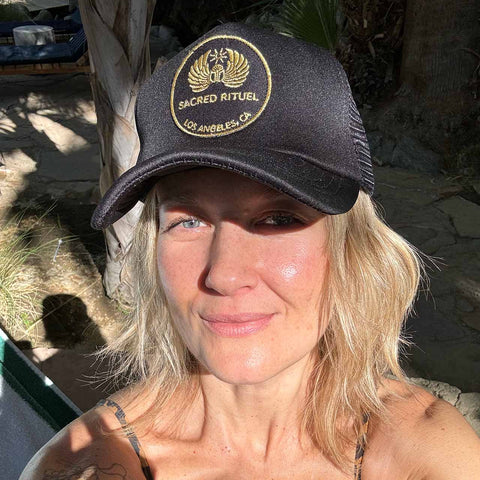
How To Treat Acne Naturally
Key Takeaways:
- Natural Ingredients: Learn about the top natural ingredients like tea tree oil, aloe vera, and honey that can effectively treat acne.
- DIY Recipes and Tips: Get easy-to-follow DIY recipes and practical lifestyle tips to prevent and manage acne naturally.
- Avoid Common Mistakes: Understand common mistakes to avoid when using natural acne treatments to maximize their effectiveness.
At Sacred Rituel, we harness the power of the earth's most sacred, healing plants to create high-potency, all-organic skincare solutions. Our products are crafted with care, ensuring that every ingredient is sourced sustainably and ethically to provide maximum benefits for your skin.
Acne is a common yet frustrating skin condition that can affect individuals of all ages. Many people are now seeking natural remedies to avoid the potential side effects associated with chemical-based treatments. Natural acne treatments utilize ingredients known for their gentle, yet effective, healing properties. These treatments can help reduce inflammation, kill bacteria, and promote skin regeneration without causing further irritation.
In this piece, we will be discussing various natural ways to treat acne, offering tips and insights on how to incorporate these methods into your skincare routine for clearer, healthier skin.
Ready to transform your skincare routine with the power of natural ingredients? Explore Sacred Rituel’s most popular picks and discover the benefits of our high-potency, all-organic solutions. Embrace a holistic approach to clear, healthy skin today.
Understanding What Causes Acne: Key Factors and Insights
Acne occurs when hair follicles become clogged with oil, dead skin cells, and bacteria. Understanding the root causes and identifying symptoms can help in effective treatment and prevention.
Excess Sebum Production
The sebaceous glands produce too much oil, which can clog pores and create an environment for bacteria to thrive. This overproduction is often triggered by hormonal changes or genetics. Managing oil production through skincare and lifestyle adjustments can help control acne.
Dead Skin Cells
When dead skin cells are not shed properly, they mix with oil and clog hair follicles. This blockage can lead to the formation of comedones, which are the precursors to acne lesions. Regular exfoliation and maintaining a proper skincare routine can help prevent this issue.
Bacteria
The bacterium Propionibacterium acnes thrives in clogged hair follicles, causing inflammation and infection. This can result in various forms of acne, from mild whiteheads to severe cystic acne. Using antibacterial treatments can help reduce the bacterial load on the skin.
Hormonal Changes
Hormonal fluctuations, particularly during puberty, menstruation, pregnancy, and stress, can increase oil production in the skin. This hormonal imbalance often exacerbates acne outbreaks. Monitoring hormone levels and seeking medical advice can be crucial in managing hormonally induced acne.
Diet and Lifestyle
Certain foods, especially those high in sugar and dairy, can trigger acne. Additionally, stress and lack of sleep can disrupt hormonal balance and skin health, contributing to acne development. Adopting a balanced diet, reducing stress, and ensuring adequate sleep can significantly impact acne prevention.
Understanding The Symptoms of Acne: Your Guide To Clear Skin
Recognizing the symptoms of acne is crucial for effective treatment and management. Acne manifests in various forms, each with distinct characteristics:
- Whiteheads - Closed clogged pores that appear as small, white bumps on the skin. They are usually non-inflammatory but can become infected if not treated properly. Maintaining a clean skincare routine can prevent whiteheads from developing.
- Blackheads - Open clogged pores that turn dark due to oxidation. Unlike whiteheads, blackheads are exposed to air, causing the trapped oil to darken. Regular use of exfoliants and pore-cleansing treatments can help reduce blackheads.
- Papules - Small red, tender bumps that occur when clogged hair follicles become inflamed. Papules do not contain pus but can be sensitive to touch. Avoiding irritation and using anti-inflammatory products can help manage papules.
- Pustules - Pimples with pus at their tips, indicating infection. Pustules are inflammatory lesions that can be painful and may leave scars if picked or squeezed. Using topical treatments with antibacterial properties can help clear pustules.
- Nodules - Large, solid, painful lumps beneath the skin surface. Nodules result from severe inflammation and can take weeks to heal, often leading to scarring. Seeking professional dermatological treatments is often necessary for nodules.
- Cysts - Painful, pus-filled lumps beneath the skin that are similar to nodules but contain more pus. Cysts are the most severe form of acne and can cause significant scarring. They often require medical intervention to prevent long-term skin damage.
Benefits Of Natural Acne Treatments
Natural acne treatments offer several advantages over conventional methods. Here are some of the key benefits:
- Gentle on the Skin: Natural ingredients are often less harsh than synthetic chemicals, which reduces the risk of irritation and dryness. This makes them suitable for sensitive skin types.
- Fewer Side Effects: Using natural remedies can minimize the risk of adverse reactions that are commonly associated with chemical-based treatments. This helps maintain overall skin health.
- Nutrient-Rich: Many natural ingredients are rich in vitamins, minerals, and antioxidants that nourish the skin and promote healing. These nutrients support skin regeneration and repair.
- Anti-Inflammatory Properties: Natural substances like aloe vera and green tea have anti-inflammatory properties that can help reduce redness and swelling. This aids in calming irritated skin.
- Antibacterial Effects: Ingredients such as tea tree oil and honey possess antibacterial properties that can help combat the bacteria responsible for acne. This reduces the likelihood of infections and breakouts.
- Sustainable and Eco-Friendly: Natural treatments are often more environmentally friendly, as they tend to be biodegradable and have a smaller ecological footprint. Choosing these treatments supports a holistic approach to wellness.
Embracing natural acne treatments not only supports healthier skin but also aligns with a sustainable and holistic lifestyle.

Top Natural Ingredients For Acne Treatment
Natural remedies for acne often involve ingredients that have been used for their medicinal properties for centuries. Here are some of the most effective natural ingredients for treating acne:
Jojoba Oil
Jojoba oil is structurally similar to the natural oil (sebum) produced by our skin, which allows it to balance oil production. It helps to dissolve excess sebum, thereby unclogging pores and preventing acne. Its antibacterial properties protect the skin from harmful bacteria that can lead to breakouts. Additionally, jojoba oil has anti-inflammatory properties that help to reduce redness and swelling, promoting a smoother, clearer complexion.
Rosehip Oil
This oil is rich in essential fatty acids and antioxidants, which are integral for tissue and cell regeneration in the skin. It is particularly beneficial for reducing acne scars and pigmentation. Rosehip oil's vitamin A content helps to improve skin tone, texture, and pigmentation. Its moisturizing properties ensure that the skin remains hydrated without clogging pores, making it an excellent choice for acne-prone skin.
Tea Tree Oil
Renowned for its anti-inflammatory and antimicrobial properties, tea tree oil helps to reduce the bacteria that cause acne. It can penetrate deep into the skin to unblock sebaceous glands, disinfect pores, and dry out whiteheads, blackheads, pimples, and other blemishes. Additionally, its soothing properties help to reduce redness and swelling. Regular use can promote a clearer, smoother complexion.
Aloe Vera
Known for its soothing and healing properties, aloe vera helps to reduce inflammation and redness associated with acne. It contains natural salicylic acid and sulfur, which are used extensively in the treatment of acne. Aloe vera can help to unclog pores and acts as an astringent, reducing the presence of bacteria. Its hydrating properties also ensure that the skin remains moist and promotes faster healing of acne lesions.
Witch Hazel
As a natural astringent, witch hazel helps to tighten the skin and reduce the size of pores, thereby controlling oil production. It is effective in removing excess oil and reducing the inflammation and redness associated with acne. Witch hazel’s anti-inflammatory properties help to calm irritated skin and reduce the risk of infection. It also aids in maintaining the skin's natural pH balance, which is crucial for preventing breakouts.
Lifestyle Tips For Preventing Acne Naturally
In addition to topical treatments, adopting certain lifestyle habits can significantly help in preventing acne. Here are some tips to consider:
Maintain A Healthy Diet
Eat a balanced diet. Incorporate plenty of fruits, vegetables, whole grains, and lean proteins into your diet. Reduce Sugar and Dairy Intake. High sugar and dairy consumption have been linked to acne. Try to limit these foods to see if your skin improves, and, drink plenty of water to help flush out toxins and keep your skin hydrated.
Practice Good Skincare Habits
Wash your face twice a day with a gentle cleanser to remove dirt, oil, and impurities. However, avoid over-washing. Over-washing can strip your skin of its natural oils, leading to more oil production and potentially more acne. Also, choose skincare and makeup products labeled as non-comedogenic, meaning they won't clog pores.
Manage Stress
Practice relaxation techniques, engage in activities like yoga, meditation, or deep-breathing exercises to reduce stress. Also aim for 7-9 hours of quality sleep each night to allow your body to repair and rejuvenate.
Keep Your Environment Clean
Change pillow cases regularly. Pillowcases can accumulate oil, dirt, and bacteria. Change them at least once a week. Your phone screen can also transfer bacteria to your face. Wipe it down regularly with a disinfectant.
Avoid Touching Your Face
Try to avoid touching your face throughout the day to prevent the spread of bacteria and oil. Most importantly, don’t pick or pop pimples. This can lead to scarring and further inflammation. Use treatments to address acne instead.
Common Mistakes to Avoid in Natural Acne Treatment
While natural treatments can be effective, it's essential to avoid common mistakes that could worsen your acne or hinder your progress. Here are some pitfalls to watch out for:
Overusing Natural Ingredients
Applying too much of a natural remedy can irritate your skin. For example, using undiluted tea tree oil can cause dryness and irritation. Always follow recommended guidelines. Additionally, combining multiple natural ingredients at once can lead to adverse reactions. Stick to one or two treatments at a time to see how your skin responds.
Inconsistent Use
Natural treatments require consistent use to be effective. Skipping applications or frequently changing treatments can delay results. Natural remedies often take longer to show results compared to conventional treatments. Give each remedy at least a few weeks before assessing its effectiveness.
Ignoring Skin Type
Some natural ingredients may be too harsh for sensitive skin. Conduct a patch test before applying any new treatment to your face. Choose remedies that match your skin type; for example, oil-based treatments may not be suitable for already oily skin.
Poor Skincare Habits
Many natural treatments can make your skin more sensitive to the sun, so always use sunscreen during the day to protect your skin. Even if you have oily skin, it's essential to moisturize, as natural treatments can sometimes dry out your skin. Use a non-comedogenic moisturizer.
Unhealthy Lifestyle Choices
Relying solely on topical treatments while neglecting a healthy diet and hydration can undermine your efforts. Ensure you're supporting your skin from the inside out by maintaining a balanced diet and staying hydrated.

Final Thoughts
Embracing natural acne treatments can significantly improve your skincare routine, offering a gentler and more holistic approach to achieving clear, healthy skin. Natural remedies like tea tree oil, aloe vera, and honey provide benefits that extend beyond just treating acne—they support overall skin health. Choosing these natural solutions helps address the root causes of acne while minimizing the risk of irritation and side effects from synthetic chemicals.
Our dedication to using nature's most sacred healing plants reflects our belief in the effectiveness of natural skincare. Our high-potency, all-organic products are designed to provide sustainable and ethical solutions for your skin. Opting for natural acne treatments is part of a broader lifestyle choice that values both personal well-being and environmental care. Remember, patience and consistency are essential. With the right natural ingredients and mindful skincare practices, you can achieve the clear, radiant skin you desire.
Read also:
- New Blog: How Jojoba Oil heals both acne and dry skin: A skincare Adaptogen
- Managing Acne-Prone Skin: Expert Advice and Solutions
- Rosacea vs. Acne: Understanding the Differences and Similarities
Frequently Asked Questions About Natural Acne Treatment
What is natural acne treatment?
Natural acne treatment involves using ingredients derived from nature, such as plants, herbs, and minerals, to treat and prevent acne. These treatments are typically free from synthetic chemicals and are considered gentler on the skin.
Are natural acne treatments effective?
Yes, natural acne treatments can be effective for many people. Ingredients like tea tree oil, honey, and aloe vera have been shown to reduce acne symptoms due to their antibacterial, anti-inflammatory, and soothing properties.
Can natural acne treatments be used on sensitive skin?
Most natural acne treatments are suitable for sensitive skin, but it is essential to patch test any new product or ingredient to ensure there is no adverse reaction. Ingredients like aloe vera and chamomile are particularly gentle.
How long does it take to see results from natural acne treatments?
Results can vary depending on the severity of the acne and the specific treatment used. Generally, it can take a few weeks to a few months to see significant improvements with consistent use.
Are there any side effects of using natural acne treatments?
While natural treatments are generally safer, some people may still experience side effects such as skin irritation or allergic reactions. It’s crucial to test products on a small skin area before full application.
Can natural acne treatments be used alongside conventional treatments?
Yes, natural treatments can often be used in conjunction with conventional treatments. However, it’s best to consult with a dermatologist to ensure there are no potential interactions or contraindications.
What lifestyle changes can complement natural acne treatments?
Maintaining a balanced diet, staying hydrated, managing stress, and practicing good skincare hygiene can complement natural acne treatments and help prevent breakouts.
Is diet important in natural acne treatment?
Yes, diet can play a significant role in managing acne. Foods high in antioxidants, vitamins, and minerals can support skin health, while reducing sugar and dairy intake may help reduce breakouts.
Can essential oils help in natural acne treatment?
Certain essential oils like tea tree oil, lavender oil, and rosemary oil have antibacterial and anti-inflammatory properties that can help treat acne. They should be diluted with carrier oils before application.
What are some common natural ingredients to avoid for acne-prone skin?
Avoid using coconut oil and other comedogenic oils that can clog pores. Additionally, harsh exfoliants like walnut shells can irritate and worsen acne.
Sources:
- Nasri, H., Bahmani, M., Shahinfard, N., Moradi Nafchi, A., Saberianpour, S., & Rafieian Kopaei, M. (2015). Medicinal Plants for the Treatment of Acne Vulgaris: A Review of Recent Evidences. Jundishapur Journal of Microbiology, 8(11). https://doi.org/10.5812/jjm.25580
- Leung, A. K., Barankin, B., Lam, J. M., Leong, K. F., & Hon, K. L. (2021). Dermatology: how to manage acne vulgaris. Drugs in Context, 10, 2021–20286. https://doi.org/10.7573/dic.2021-8-6
- Simonart, T. (2012). Newer Approaches to the Treatment of Acne Vulgaris. American Journal of Clinical Dermatology, 13(6), 357–364. https://doi.org/10.2165/11632500-000000000-00000







Comments (0)
There are no comments for this article. Be the first one to leave a message!